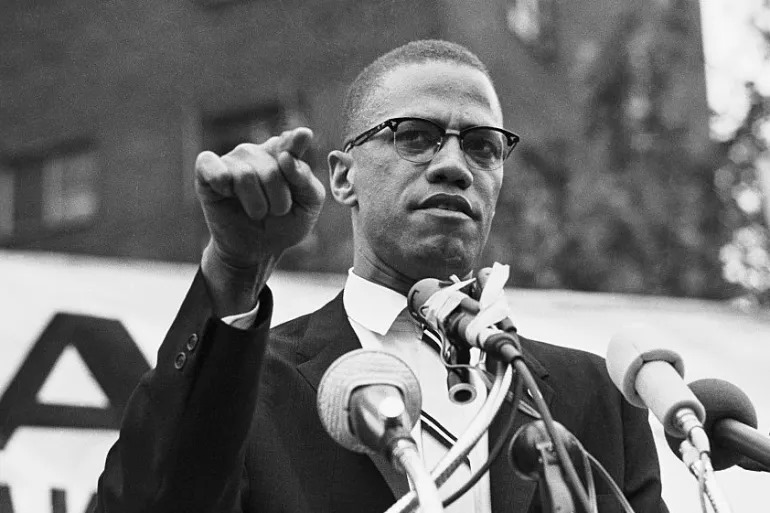
[Photo: Al Jazeera]
Malcolm X -freedom, faith and Palestine
By Ayesha Omar
In the contemporary world, Malcolm X (el-Hajj Malik el–Shabazz) has transcended from a historical figure of the civil rights movement to a revered cultural symbol, political icon and intellectual of black resistance. Malcolm X’s figure has been appropriated variously to symbolize social and political change. Scholars have drawn upon Malcolm X’s writings, speeches, and ideas to explore themes of race, identity and social justice. His intellectual legacy continues to shape discussions on the Black Lives Matter movement and the intersection of religion and activism.
Malcolm X’s biography and political ideas provide an extraordinary lens into social history, offering valuable insights into the civil rights movement and the black American struggle against systemic oppression. His early life, religious transformation, political activism, and internationalism shed light on the complexities of his persona and beliefs. His engagement with different political philosophies and movements demonstrates the complexity of his thoughts and actions. His speeches, letters and other documents which constitute his political thought reflect an enduring commitment to social justice, self-determination, and the pursuit of equality for all individuals.
From his political thinking, two key aspects can be foregrounded for its salience in the contemporary world. First is the transformative power of faith. Malcolm X discusses the role of Islam in his life, emphasizing the importance of spiritual enlightenment in the fight against oppression. This intersection of Malcolm X’s religious beliefs and political thought demonstrates how his Islamic faith influenced his advocacy for social justice and black liberation. Moreover, he believed that the combination of Islam and Black Nationalism was essential in addressing the challenges faced by the black community. He saw Islam as a spiritual force that could help uplift and empower African Americans.
Malcolm X embraced a universalistic interpretation of Islam, considering it a tradition that transcended racial boundaries and connected people on a human level. In his “Letters from Abroad”, he observes the unity and brotherhood among Muslims on the Hajj Pilgrimage, emphasizing that true Islam removes racism by promoting sincere and equal relationships among believers. He describes the Hajj as a transformative experience in which he gains spiritual enlightenment.
In Africa, Malcolm X experienced a strong sense of kinship with the African people, who viewed African Americans as long-lost brothers. He was markedly influenced by the Pan-Africanist ideas of the Jamaican philosopher Marcus Garvey. Malcolm X incorporated Garvey’s central insights into his own thought, arguing that the struggles of Black people in various parts of the world were interconnected and rooted in a common experience of oppression and exploitation.
The scholar Edward Curtis argues that Malcolm X’s Islamic identity coexisted with his black nationalist beliefs, leading to a form of DuBoisian “double consciousness” where he navigated the complexities of balancing his religious and political commitments. He saw both identities as integral parts of an authentic and cohesive worldview.
The second key aspect of Malcolm X’s political thought is his focus on the global nature of the struggle for black liberation, which highlights the connections between the African diaspora and other oppressed peoples around the world. Here, he calls for unity and solidarity among all marginalised and disenfranchised groups. Of particular contemporary relevance is his treatment of the question of Palestine. Malcolm X’s visit to the Khan Younis refugee camp in Gaza in 1964 was a poignant reminder for him of the dispossession of African Americans. He was profoundly affected by the systematic displacement and erasure of Palestine through the Nakba. It led him to draw parallels between the Palestinian struggle and the Black American fight for equality. In a speech he delivered in Cairo in 1964, he remarked: “The problem that exists in Palestine is not a religious problem…It is a question of colonialism. It is a question of a people who are being deprived of their homeland.”
Malcolm X also challenged the ontological foundation of Zionism, seeing it as a form of colonialism that denied Palestinian self-determination. While initially sceptical of a two-state solution, he later saw it as a potential path to justice: “We need a free Palestine… We don’t need a divided Palestine. We need a whole Palestine”, he states in a speech he delivered in Detroit in 1965. Malcolm X viewed the Israeli-Palestinian conflict through the lens of anti-colonialism and anti-imperialism, aligning himself with the Palestinian struggle for sovereignty. By advocating for the rights of Palestinians and denouncing Israeli aggression, Malcolm X underscores his conviction in international solidarity and the indivisible link between liberation movements around the world. His stance on the Palestinian issue reflects his broader principles of justice, equality, and resistance against oppression in all its forms.
Dr Ayesha Omar is a Senior lecturer in Political studies at the University of the Witwatersrand and is currently a British Academy International Fellow at SOAS, University of London. She is working on a new book project on ‘Black Intellectual History in South Africa’.


